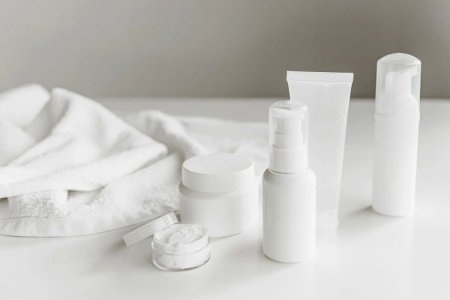New study links everyday chemical to heart disease—what you should know
By
Veronica E.
- Replies 0
Looking your best shouldn’t come at a cost to your health—but a new study is raising concerns about a common ingredient found in many everyday cosmetics and personal care items.
The findings are prompting scientists and health advocates to take a closer look at what we’re putting on our skin—and how it might affect our hearts.
DEHP (di-2-ethylhexyl phthalate) is part of a group of chemicals known as phthalates, which are used to make plastics flexible and to help scents last longer in products like lotions, deodorants, and shampoos.
According to researchers, up to 75% of scented personal care items may contain phthalates.
Often called “forever chemicals,” phthalates don’t break down easily in the environment or in the body.
Over time, they can accumulate and potentially lead to health issues.

A recent study published in Lancet eBiomedicine found a possible link between DEHP and chronic inflammation in the arteries.
This inflammation may contribute to atherosclerosis—plaque buildup that narrows blood vessels and increases the risk of heart attack and stroke.
Key findings include:
Phthalates are commonly found in products marketed toward women, meaning women may have higher levels of exposure than men.
However, the risk extends to everyone, since phthalates are also found in items like:
Research has also linked phthalates to fertility issues, early puberty in girls, and other long-term health concerns.
At least nine types of phthalates, including DEHP, are still allowed in cosmetics sold in the US.
Some states, like California, have passed regulations requiring warning labels on products with higher levels of certain phthalates.
In contrast, European countries allow only one phthalate in cosmetics.
Federal agencies like the FDA are reviewing safety data, but these chemicals remain widely used in both beauty and household products for now.
The good news: You can take small steps to limit your contact with phthalates. Here are a few to consider:
Phthalates like DEHP are present in many common products—but understanding the risks can help you make safer choices.
Swapping out a few items and staying informed may go a long way in reducing your long-term exposure and protecting your heart health.
Read next: Stop doing this now: Scientists reveal why it’s a bad idea to reuse plastic bottles and to-go containers

Have you started using phthalate-free products? Do you have tips on choosing safer options? We’d love to hear from you. Share your experience in the comments—your story might help someone else make a healthier change.
The findings are prompting scientists and health advocates to take a closer look at what we’re putting on our skin—and how it might affect our hearts.
DEHP (di-2-ethylhexyl phthalate) is part of a group of chemicals known as phthalates, which are used to make plastics flexible and to help scents last longer in products like lotions, deodorants, and shampoos.
According to researchers, up to 75% of scented personal care items may contain phthalates.
Often called “forever chemicals,” phthalates don’t break down easily in the environment or in the body.
Over time, they can accumulate and potentially lead to health issues.

New research is raising concerns about ingredients commonly found in personal care products and their potential link to heart health. Image Source: Pexels / ROMAN ODINTSOV.
What the research shows about heart health
A recent study published in Lancet eBiomedicine found a possible link between DEHP and chronic inflammation in the arteries.
This inflammation may contribute to atherosclerosis—plaque buildup that narrows blood vessels and increases the risk of heart attack and stroke.
Key findings include:
- Globally: More than 350,000 cardiovascular deaths each year may be linked to DEHP exposure
- In the US: Roughly 10,000 deaths annually—or 1 in 8 heart-related deaths—may be tied to this chemical
- The study also estimates DEHP contributes to over 316,000 years of lost human life in the US due to heart disease
Who may be most at risk?
Phthalates are commonly found in products marketed toward women, meaning women may have higher levels of exposure than men.
However, the risk extends to everyone, since phthalates are also found in items like:
- Food containers and packaging
- Shower curtains and vinyl flooring
- Garden hoses and plastic wraps
Research has also linked phthalates to fertility issues, early puberty in girls, and other long-term health concerns.
Also read: Are microplastics hiding in your favorite fast food? Find out!
Why are these chemicals still used?
At least nine types of phthalates, including DEHP, are still allowed in cosmetics sold in the US.
Some states, like California, have passed regulations requiring warning labels on products with higher levels of certain phthalates.
In contrast, European countries allow only one phthalate in cosmetics.
Federal agencies like the FDA are reviewing safety data, but these chemicals remain widely used in both beauty and household products for now.
Also read: How much plastic is in your brain? New study reveals a shocking spoonful of truth!
What you can do to reduce your exposure
The good news: You can take small steps to limit your contact with phthalates. Here are a few to consider:
1. Read product labels
- Choose items labeled “phthalate-free” or “fragrance-free”
- Be cautious of vague terms like “fragrance” or “parfum,” which can hide phthalates
2. Use safer alternatives
- Opt for naturally scented or unscented products
- Store food in glass or stainless steel containers instead of plastic
3. Avoid heating plastics
- Do not microwave food in plastic containers
- Look for BPA-free labels and limit use of plastic wrap
4. Support safer choices
- Choose brands that commit to removing phthalates
- Let retailers and lawmakers know you support safer chemical policies
5. Stay informed
- Follow updates from trusted sources like the FDA, CDC, and environmental health groups to keep up with evolving research
Phthalates like DEHP are present in many common products—but understanding the risks can help you make safer choices.
Swapping out a few items and staying informed may go a long way in reducing your long-term exposure and protecting your heart health.
Read next: Stop doing this now: Scientists reveal why it’s a bad idea to reuse plastic bottles and to-go containers
Key Takeaways
- A new study has found that a "forever chemical" called di-2-ethylhexyl phthalate (DEHP), widely used in cosmetics and plastics, could be linked to more than 350,000 cardiovascular deaths worldwide each year.
- Researchers say DEHP exposure may trigger inflammation in the heart's arteries, increasing the risk of heart attack and stroke.
- These chemicals are present in scented personal care products, food containers, and household plastics, and have also been associated with fertility issues and early puberty.
- Health experts and scientists are calling for stronger regulation of phthalates in the US to help reduce widespread exposure and associated health risks.
Have you started using phthalate-free products? Do you have tips on choosing safer options? We’d love to hear from you. Share your experience in the comments—your story might help someone else make a healthier change.






